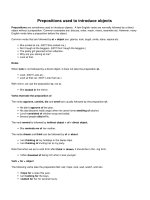Prepositions used to introduce objects
Bạn đang xem bản rút gọn của tài liệu. Xem và tải ngay bản đầy đủ của tài liệu tại đây (17.07 KB, 2 trang )
Prepositions used to introduce objects
Prepositions
are sometimes used to introduce objects. A few English verbs are normally followed by a direct
object without a preposition. Common examples are: discuss, enter, reach, marry, resemble etc. However, many
English verbs take a preposition before the object.
Common verbs that are followed by
at + object
are: glance, look, laugh, smile, stare, rejoice etc.
She smiled at me. (NOT She smiled me.)
Don’t laugh at the beggars. (NOT Don’t laugh the beggars.)
The pretty girl glanced at her reflection.
Why are you staring at me?
Look at that.
Notes
When
look
is not followed by a direct object, it does not take the preposition
at.
Look. (NOT Look at.)
Look at that car. (NOT Look that car.)
With mirror, we use the preposition
in
, not at.
She
looked in
the mirror.
Verbs that take the preposition of
The verbs
approve, consist, die
and
smell
are usually followed by the preposition
of.
He didn’t
approve of
the plan.
His dad became really angry when he came home
smelling of
alcohol.
Lunch
consisted of
chicken soup and salad.
Several people
died of
flu.
The verb
remind
is followed by
indirect object + of + direct object.
She
reminds me of
her mother.
The verbs
dream
and
think
can be followed by
of
or
about
.
I am
thinking of
my holidays in the Swiss Alps.
I am
thinking of
inviting her to my party.
Note that when we put a verb form after
think
or
dream
, it should be in the –ing form.
I often
dreamed of
being rich when I was younger.
Verb + for + object
The following verbs take the preposition
for
: call, hope, look, wait, watch, wish etc.
I
hope for
a raise this year.
I am
looking for
the keys.
I
waited for
her for several hours.
To
watch for
something is to pay attention so that you will see it when it arrives or becomes visible.
Watch for
the birds. They will eat the grains.
If you
wish for
a promotion, you have to impress the manager.
Be first to know when grammar rules change! Sign up to our newsletter here: englishgrammar.org (It's free)
Powered by TCPDF (www.tcpdf.org)









